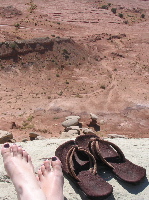Book Review: Halima Bashir's Tears of the Desert
Over the weekend I read Tears of the Desert: A Memoir of Survival in Darfur by Halima Bashir.
Tears of the Desert details the life of Halima Bashir, a doctor who grew up in Darfur and now lives in the UK. Her story is told in a straightforward manner: how she grew up and how her family and village were important to her, how she went to school and enjoyed it and eventually went on the medical school, how war crept into her life until it became un-ignorable and eventually destroyed her life, her home, her family, and how she finally escaped from Sudan and managed to put together a new life in England. It most places—even the childhood stories—the story is riveting (which, unfortunately, also means that some of the explicit statements of foreboding come across and cheesy and unecessary). The storytelling is also often unexpectedly hilarious; I found myself laughing out loud quite a few times.
As a personal accounting of the history of the Darfur conflict, Tears of the Desert is a powerful story of how innocent lives are completely torn asunder. Bashir has lived through things that most of her readers cannot possibly imagine (yet, of course, as the book is written in the first person, we the readers know that, she at least, has survived). Her story thrusts raw emotion into the too easily glossed-over refugee and death statistics streaming out of the region. However, I found the book almost too insular at times; for example, the only year explicitly stated (aside from in the short epilogue), is the date of Bashir's birth: 1979. I was constantly adding and subtracting to determine approximate dates, and so as an actual history Tears of the Desert unfortunately falls a little short and does not serve well as an introduction to the Darfur crisis, and I fear that in ten to twenty years this fact will make it an even more difficult read. Likewise, no map is offered and only a brief description as to the underlying cause of the conflict and why the UN is doing little to stop it is given in the epilogue.
Regardless, a reader who first spends half an hour reading about the Darfur situation online should have plenty of context in which to set this book, and Tears of the Desert provides a far more personal and accessible accounting than anything the internet (or most anywhere else) has to provide.
Tears of the Desert will be on sale in the US on September 9, 2008.


1 comment:
I found the book to be very insightful. I know only a little about the horror that is going on in Darfur. But by reading Bashir's story I got the feel of how life was/is for the people that live in that region. The book, to me, was well writtien. Yeah,I do agree that maybe she should have used dates. But it's not that hard to figure out what events took place in what year. But then again Bashir is only two years older than me so maybe this helped me more. I'm am of African descent. I've never been there and to know how the people lived there was something dear to me. I hate what happened to her and the others. It made me realize how good I have it here in America and how I shouldn't take advantage of what I have. There is no way I could have survived through those tragic events. I'm not that strong. Bashir is an amazing woman and I'm glad to have read her story. I pray that she may soon find her family safe and well.
Post a Comment